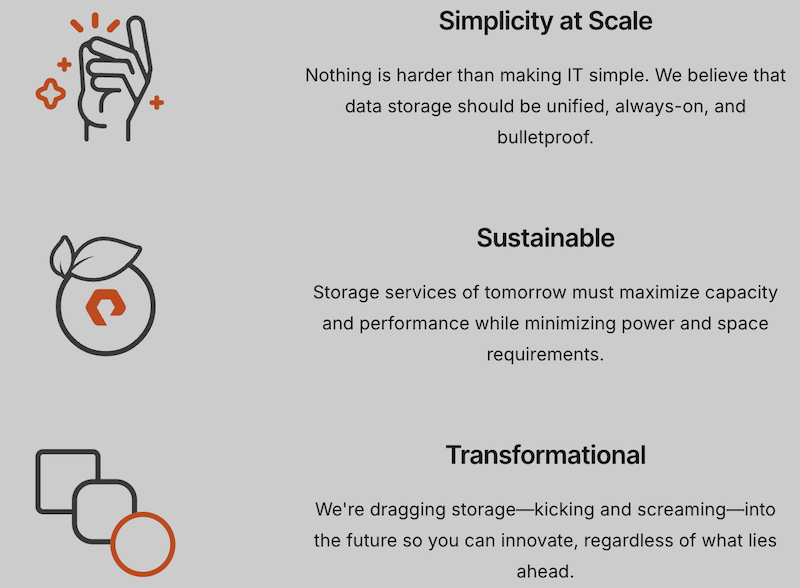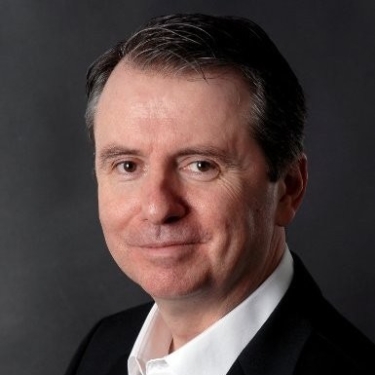Pure Storage CTO, International Alex McMullan has been visiting Australia to speak with customers and interested parties about their cloud journey. Pure Storage brings a lot of strength and expertise on this, including how to balance workloads across public and private clouds.
Where Pure Storage can also help is with cost-effective storage as a service (STaaS) and with sustainability. These are two conversations where Pure Storage is uniquely positioned, because the company has made these specific strategic focus areas, and dedicated significant thought, skill, and effort.
When it comes to STaaS, McMullan explains Pure Storage has "actual storage as a service" with a platform that brings automation and a full REST API, along with economic benefits.
|
|
"Our STaaS brings cloud native behaviour and cloud consumption. We want to disrupt," he said. "Many large tech companies will utility and leasing, but that's just finance by a different vehicle."
"Pure Storage's view is we want to do STaaS properly. You pay for a service vs. an asset, and we retain the asset, but the customer pays on a schedule with the same freedom as you'd have with Azure, AWS, GCP, etc."
"You can consume our tech as you would the public cloud," McMullan said. "It's a market-leading position. Many competitors have made a model that looks a bit cloudy but it's not."
When it comes to sustainability, Pure Storage is bucking the trend of big tech firms, saying it has a part to play in aiding customers achieve their sustainability goal.
It's a common trend globally that AI - particularly Generative AI - has taken the world's imagination by storm. The message from technology providers is consistent: companies who embrace AI will lead, those who delay or ignore it will fall behind.
So, it's no surprise then that McMullan told iTWire no matter where he is in the world customers want to speak about how to adopt AI. However, McMullan notes, they want to adopt it sustainably.
Pure Storage knows what it's talking about; it partnered with Nvidia seven years ago, back in 2017, before AI was the fashion and trend we see today. "We produced the first AI storage platform," McMullan said, "and had a public relationship with Meta/Facebook for the same period."
It's embedded AI in its own products, bringing predictability into the storage array, as well as a copilot so storage administrators can ask natural language questions about the system's health and find solutions to problems.

Over the last two decades there has been an increasing awareness worldwide that energy consumption must be reduced. Tech firms stood up to the challenge, minituarising equipment, consolidating services, simplifying packaging, all with the aim to cut carbon emissions. Yet, it's as if this no longer mattered in some ways with today's demand for more and more GPUs to drive ever-increasingly power hungry generative AI.
While organisations everywhere are striving to set and hit environmental and sustainability goals, with committments to reduce their emissions, they are, at the same time, being lured in by the promise of super-capable AI, along with the threat if they don't embrace it, their business will become irrelevant.
Pure Storage is tackling this challenge in a number of ways, saying it has a sombre responsibility. "Big business wants to be as energy efficient as possible, and green is part of that," McMullan said. "If we, as suppliers, don't have things that use less energy and generate less carbon then we're part of the problem."
To tackle this, Pure Storage has made storage a circular economy. "We want to give customers freedom," McMullan said. "We try to recycle assets as they come back. We want more than 50% of our STaaS cloud to come from recycled assets."
"It sets us apart from the typical equipment journey of buying, returning, landfill."
Additionally, Pure Storage continues to explore the materials it uses. "A Pure Storage system of 40 to 50kg has about four to five kilograms of carbon embedded in it because of all the supply chain processes," McMullan said. "It's a big tech debt," he said, and explained the company is taking a leadership role in working with all its suppliers of silicon to embed less carbon in the chips they supply, which in turn diminishes the carbon that lands up with the end customer. "The chip vendors tell us we're the ones pushing the limit on this."
As well, "we've invested in a company working on laser-etched ceramic glass," McMullan said as one example. "We think things like that are interesting to long-term move away from silicon - not just to keep the status quo, but to improve."
In fact, with all these activities, Pure Storage has already reached 50% scoped year reductions in the carbon it embeds in its device, over the last three years. The company set their goal to 60% by 2030 and is ahead of that schedule.
Sustainability isn't simply a feel-good topic. For McMullan it's a serious issue. "AI will cost more coal, more CO2 - it's something we should push hard on," he said. Pure Storage takes it so seriously it has a lobby group inside the European Union to push power consumption in the right place.
Carbon emissions are important, but that's only one part of the problem. "Even in the EU the power grids built in the 1950s were designed for families having a cup of tea as they huddled around the radio."
"The average GPU-based system has eight GPUs in a single box from Nvidia, with each consuming enough power to run a four-person house. Each GPU system you turn on is the equivalent of eight houses. If hyperscalers are turning on half a million ... you do the maths," McMullan said. "It's quite frightening to think about the power budget.
With AI competing against carbon reduction across the world it's evident something will have to give, given the paucity of power supply around the world. "As AI takes off this creates a whole new set of pressures on the grid worldwide."
This is what Pure Storage and its CTO, International Alex McMullan spend their time thinking about. "Everyone in the industry is on the same path of building bigger systems and reducing costs, but we don't see this same innovation about energy and sustainability from our competitors," he said. "They'll recycle laptops and so on, but not in the foundational way we are applying to having a circular economy. We're pushing hard and as publicly as we can, from ESG reports through to conversations like this one."
"They'll talk about their super next box, but not what it means for carbon and the future of AI."
McMullan sees a huge opportunity for others in tech. For example, "In ANZ there's a unique opportunity for service providers like big telcos to build an AI service that's ethical and sustainable, without drawing on coal power," he said. "Maybe solar or hydro, after all, there's a lot of sunshine in Australia and New Zealand."
"We need different ways of thinking. There's a whole confluence of things where we can build sustainable AI facilities the right way and minimise our CO2 footprint."
In fact, we risk having a dystopian future of haves and have-nots where a whole series of countries could be left behind the AI wave because they lack a suitable power grid. "Some AI use cases will change the world - healthcare, genomic research, material science, and others," but with a distinct possibility these world-changing innovations cannot be realised everywhere, leaving countries left aside.
Energy is a challenge the world needs to solve. "It's not just a problem for Pure Storage; it needs tech vendors, it needs compliance," he said. "As a society, if we're not going to talk about having no power for two hours a day, then we all must collaborate and think about the solution."
It's all very sobering, and iTWire hears daily from companies of all types and industries about the amazing things AI can do. It's rare, however, to hear about the huge power consumption, and carbon production, all this AI is creating. Here, Pure Storage is certainly lifting the veil and revealing the risks behind.
Of course, while this has to be solved, there's no denying AI can help a business with cost agility, efficiency, customer service, CRM, and many, many things. Having GPUs is imperative, but right now "the supply chain is horrendous," McMullan said. "Even if you were given a big cheque, spending is hard with delivery dates extending out to six, nine, twelvem onths depending on who you know."
Thus, McMullan's recommendation for smart CIOs is to experiment in the cloud while having your own GPUs delivered. "Use the cloud to train, refine, and to drive cultural change. Then industrialise on-premises."
"You need a data-driven culture to be foundational in the way your company uses AI. Every division has its own data sets, statistics, messaging, and reporting, and all this has to be clean and managed with everyone doing it together, rather than saying I own this bit or that bit."













































